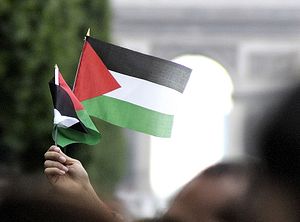In his meeting with Palestinian ambassador Walid A.M. Abu Ali on Tuesday, Pakistan Army Chief Gen. Qamar Javed Bajwa said that “Pakistan views the unresolved Palestine issue at par with the Kashmir issue.”
In the Organization of Islamic Cooperation (OIC) on Wednesday, Prime Minister Shahid Khaqan Abbasi also juxtaposed Palestine and Kashmir, maintaining that Israeli control over Palestine is similar to Indian occupation of Kashmir.
Similar efforts were witnessed on the sidelines of United Nations General Assembly in September, where Foreign Minister Khawaja Asif met Arab League Secretary General Ahmed Aboul Gheit to express “grave concern on the ongoing situation in Palestine and occupied Kashmir.”
The conflation perhaps got a bit carried away when the Pakistani envoy to the United Nations presented a picture from Gaza to make Islamabad’s case for Kashmir.
While Pakistan has always maintained that it sees the Palestinian issue with the same lens as Kashmir, it has traditionally been a gesture to highlight how important the former is for Islamabad. However, not only has Pakistan upped the ante on hyphenating the two in recent years, it seems to be using the Palestine cause as a vehicle for its narrative on Indian-administered Kashmir.
This has been visible since Indian Prime Minister Narendra Modi’s visit to Israel earlier this year, which not only symbolized tighter ties between the two states, but also gave birth to outrageous conspiracy theories in Pakistan.
Modi’s trip also had multiple joint references to “terrorism” affecting India and Israel, as exemplified by the Israeli foreign ministry’s reiteration of “mutual cooperation in the fight against terrorism.” And since militancy in Palestine and Kashmir has metamorphosed from nationalist to Islamist nature, these vows for counterterror unity was an attempt to collectively delegitimize freedom fights in both regions.
With Islamist leaders orchestrating militancy in Kashmir being sanctioned by the West – like Syed Salahuddin and Hafiz Saeed, who was recently released by Lahore High Court – the rest of the world has long distanced itself from the Islamist struggle in Kashmir – unlike Palestine.
Pakistan has been instrumental in delegitimizing its own narrative on Kashmir, by backing jihadist usurpation of the indigenous freedom struggle and also curbing human rights in its own administered Kashmir.
This is why there hasn’t been a single UN Security Council resolution on Kashmir since 1957, and 47 on the Israel-Palestine issue.
By hyphenating Kashmir and Palestine, Pakistan is clearly bidding to bring its own narrative to the forefront. But what this is inadvertently doing is further damaging not only Islamabad’s own position, but also both struggles, by reducing the conflicts to the Muslim-non Muslim binary, which is the way the jihadists see them.
Relying on the Islamist card has long been Pakistan’s strategy not only to ensure that the jihadist groups it backs remain ideologically fueled, but also because it has not had a leg to stand on when it comes to human rights. This is not only true for Pakistan-administered Kashmir and Balochistan – two conflict areas – but also the rest of the country, where many fundamental rights are constitutionally curbed.
But Islamabad remains inconsistent even in the aforementioned Islamist binary, considering that China remains its economic lifeline while Beijing implements anti-Muslim policies, most notably in the Xinjiang region. That the China-Pakistan Economic Corridor connects Xinjiang and Balochistan at its two ends perfectly symbolizes not just disregard for human rights, but Islamabad’s own duplicity over a non-Muslim majority subjugating a Muslim separatist movement.
And yet, ironically, Pakistan’s own contradictions make the Kashmir-Palestine hyphenation a perfectly rational strategy.
Pakistan can’t speak up for the East Turkestan Islamic Movement, obviously fearing Chinese backlash. And it can’t undo many human rights breaches at home since both Pakistan-administered Kashmir and Balochistan have separatist movements of their own, while the rest of the country is increasingly coming under the influence of the perilous mullah-military alliance.
Hence, Islamabad is pinning its hopes on Palestine to keep the Kashmir issue alive.

































